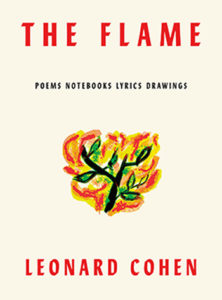 I’ve spent much of the early part of April, National Poetry Month, reading the poetry of Leonard Cohen. That’s largely because I spent much of the end of March doing the same. I came across Cohen’s last book, The Flame, among my library’s CD books, and brought it home to accompany me on my way to and from work. Halfway through, I went back to the library and got the hardcover book as well.
I’ve spent much of the early part of April, National Poetry Month, reading the poetry of Leonard Cohen. That’s largely because I spent much of the end of March doing the same. I came across Cohen’s last book, The Flame, among my library’s CD books, and brought it home to accompany me on my way to and from work. Halfway through, I went back to the library and got the hardcover book as well.
As soon as I finished the CD, I started the book. And I wasn’t ready to say goodbye to Cohen in the car, so I started over again listening to CD1. I’ve now finished my third trip through the CD and also have finished my analog read. Meanwhile, I’ve borrowed two of Cohen’s last CDs—two of the four whose lyrics are included in the book—and am listening to those for the second time.
Yes, I’ll be buying the book.
If you’re familiar with Cohen’s music, I think it’s fair to say you’re already familiar with his poetry. He was a poet before he started recording music, and all of his lyrics started as poems. But reading the poems is a very different experience from hearing the songs. The words take the spotlight, and for me the message is usually more powerful without the music. I like the music, too, but differently, and it doesn’t challenge me as much. I think more about the work when the words stand alone, and it’s well worth the effort.
Sometimes I’m bewitched by his imagery. Here’s one from “Dimensions of Love”:
…
and longing kneels down
like a calf
in the straw of amazement
…
And I honestly didn’t expect to hear the voice of e.e. cummings in Cohen’s work, but here it is in the third stanza of “Antique Song“:
…
But oh! the kisses that we kissed,
That swept me to the shore
Of seas where hardly I exist,
Except to kiss you more.
…
Two of my favorites from The Flame are dark and ominous, full of anger and frustration. I loved every word of “You Want to Strike Back and You Can’t” as I read it, and then I got to the last stanza and was laid flat. “What Is Coming 2.16.03” takes a different approach to similar themes, and also stuns me with its ending.
I’ve spent about a third of National Poetry Month reading and listening to these poems, and I’m glad I have. I’m not quite ready to stop, either, today being Palm Sunday and Easter a week away. Whatever your religion, your high holiday season seems a good time to read Cohen. His work is nothing if not reverential and spiritual.
